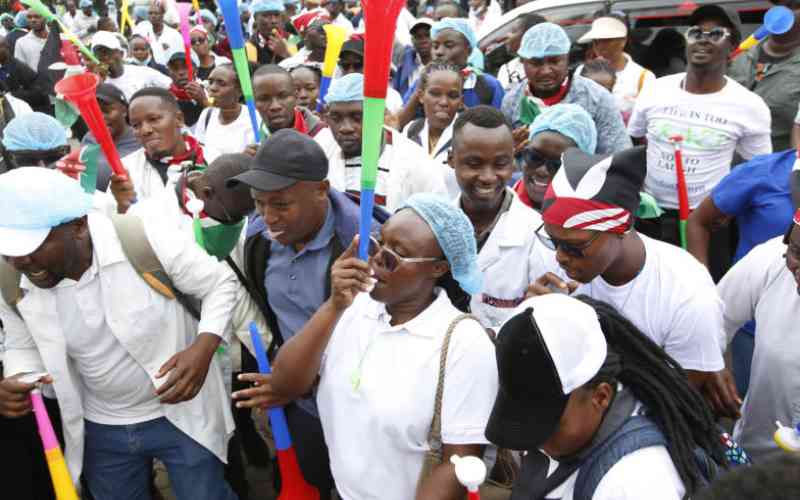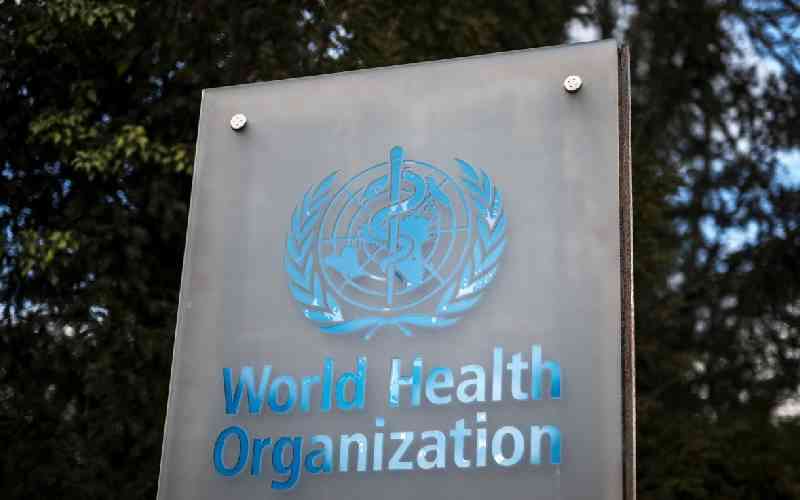
Prof Marleen Temmerman, Director of the Center of Excellence in women and child health East Africa handing over the e learning equipments to the kilifi health executive member Dr Peter Mwarogo at the Kilifi medical complex in Kilifi County. [Marion Kithi, Standard]
Kilifi County is set to establish two e-Learning centers to facilitate capacity building of healthcare workers and community health promoters on research methods, gender related studies and other clinical courses.
The Department of Health received a donation of equipment worth Sh600,000 from Women in Health and their Economic, Equity and Livelihood statuses during Emergency Preparedness and Response (WHEELER) a project funded by the Canadian International Development Research Centre (IDRC).
The equipment includes desktops, conference speakers, webcams, television sets, internet connectivity, and backup systems. The equipment will be used to communicate data collected from the community levels to the analysis centers.
The centers will be set up at Kilifi County Medical Complex and Vipingo Health Centre.
The project is a collaboration between Aga Khan University's Centre of Excellence in Women and Child Health, East Africa (CoEWCH EA), the University of Manitoba's Institute for Global Public Health, and Kilifi and Mombasa Counties.
According to Kilifi County Executive member for Health and Sanitation Services, Dr Peter Mwarogo a lot of time is wasted in the movement of healthcare workers from their workstations to the sites.
''The equipment we have received today will enable them to work remotely through the virtual platforms. The platforms will also allow knowledge transfer beyond the county and will play a crucial part in our journey towards telemedicine and e-learning," he said.
- Kilifi residents benefit from free cataract surgery
- Kenya targets to produce 6 million pneumonia vaccines every month
- Cataracts, poverty and the fight for sight in Kilifi
- Varicocele: Seek help for that persistent groin pain
Keep Reading
"We pledge our support to ensure the successful implementation of this study and are grateful for the commendable support."
The program is expected to enable them to provide policies and interventions that can be used to build resilient systems to overcome these disparities in future re-occurrence.
Prof Marleen Temmerman, Director of center of Excellence in women and child health East Africa lauded the initiative saying the collaboration with healthcare workers in the grassroots will help improve healthcare in the county.
"We are delighted to work with Kilifi County's Department of Health in collecting gendered healthcare information to be better prepared for the next epidemic," said Professor Marleen.
"Most of our projects are based in Kilifi because of the support we receive, and we look forward to strengthening our partnerships with all the six coastal counties as it takes joint effort."
The WHEELER study will build on the efforts towards the realization of the overall target of Universal Health Coverage (UHC) for inclusive human development listed under the third sustainable development goal of good health and well-being.
Dr Bilali Mazoya, the study's co-principal investigator from Kilifi County government says the study has provided a platform for the female healthcare providers to share their in-depth experiences during the pandemic.
"The human-centered design approach is a valuable component of the study that puts the provider at the center of the solutions meant to address their challenges in the day-to-day operations," he said.
Through the study, the WHEELER team aims to strengthen research capacity within the public health system in Kilifi and Mombasa counties in addition to supporting them in the generation of evidence-based, gender-responsive policy interventions for safeguarding healthcare workers during the current and future health crises.
 The Standard Group Plc is a multi-media organization with investments in media
platforms spanning newspaper print
operations, television, radio broadcasting, digital and online services. The
Standard Group is recognized as a
leading multi-media house in Kenya with a key influence in matters of national
and international interest.
The Standard Group Plc is a multi-media organization with investments in media
platforms spanning newspaper print
operations, television, radio broadcasting, digital and online services. The
Standard Group is recognized as a
leading multi-media house in Kenya with a key influence in matters of national
and international interest.











